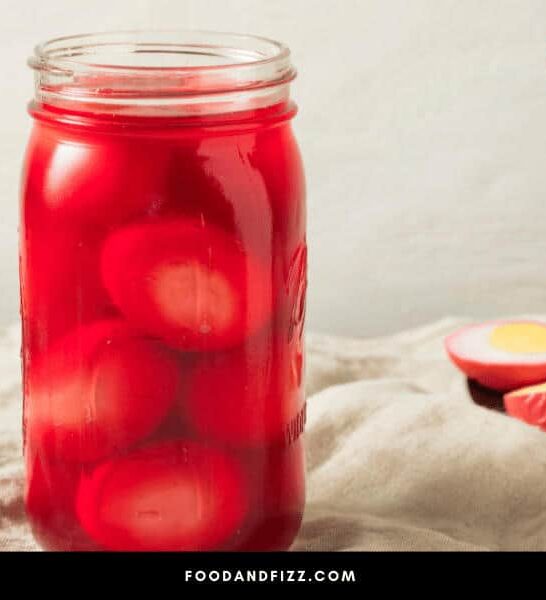Pickled eggs are hard-boiled eggs that are cured in brine or vinegar. The pickling technique is intended to preserve the egg to be consumed months later.
There is no need to worry about your health since pickled eggs are an excellent source of vitamins and proteins.
Again, eggs pickled using vinegar have most of their nutrients preserved. That makes them healthy to eat as they are or add them to salads.
Do Pickled Eggs Need to Be Refrigerated?
Pickled eggs do need to be refrigerated if they are to remain preserved for a long time. Storing pickled eggs at room temperature and eating them later may cause botulism and other unhealthy outcomes. For that reason and others, it’s advisable to refrigerate your pickled eggs. Pickling eggs and cooling them allows the eggs to remain consumable for up to four months. The most recommended refrigerator temperatures to store pickled eggs are 32°F to 34 °F.
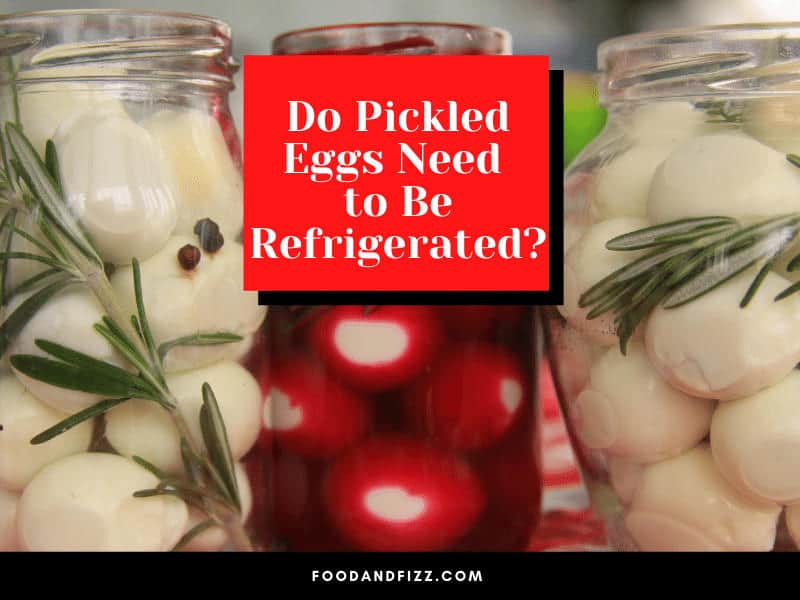
Why Pickled Eggs Need Refrigeration
While pickling eggs is meant to preserve them, it’s better to consider refrigeration of the pickled eggs. There are good reasons why I refrigerate my pickled eggs, and you should consider them too.
1. Health caution
Safety is vital during food storage, as it helps avoid food poisoning. Leaving pickled eggs at room temperatures for long could lead to botulism.
Botulism is a severe ailment where toxins attack body nerves, thus leading to breathing difficulties, paralyzed muscles, and death. The toxin develops from Clostridium baratii, Clostridium botulinum, and Clostridium butyricum.
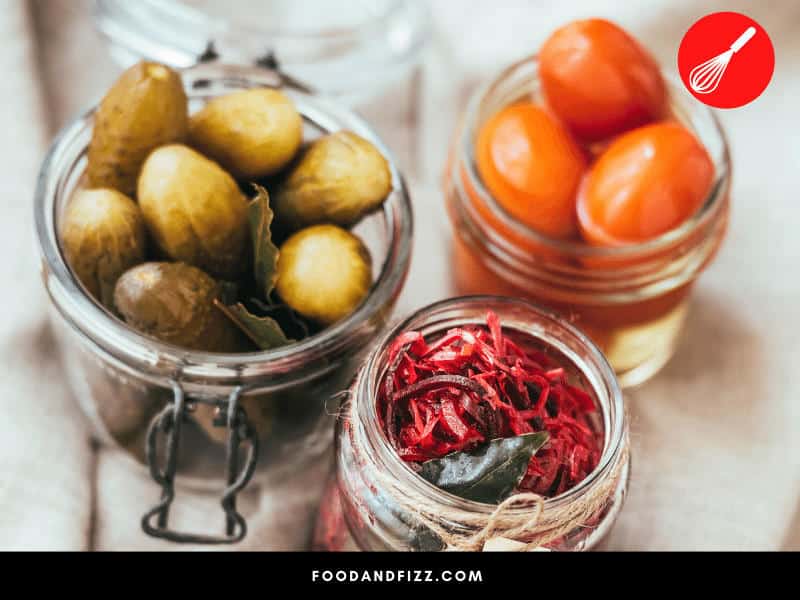
2. Preservation
When I pickle my eggs, I do so because I want them to remain preserved over an extended timeframe. However, pickling alone will not achieve this goal. As such, I have found refrigeration to be an excellent addition to pickling. That could make the eggs last slightly more than four months.
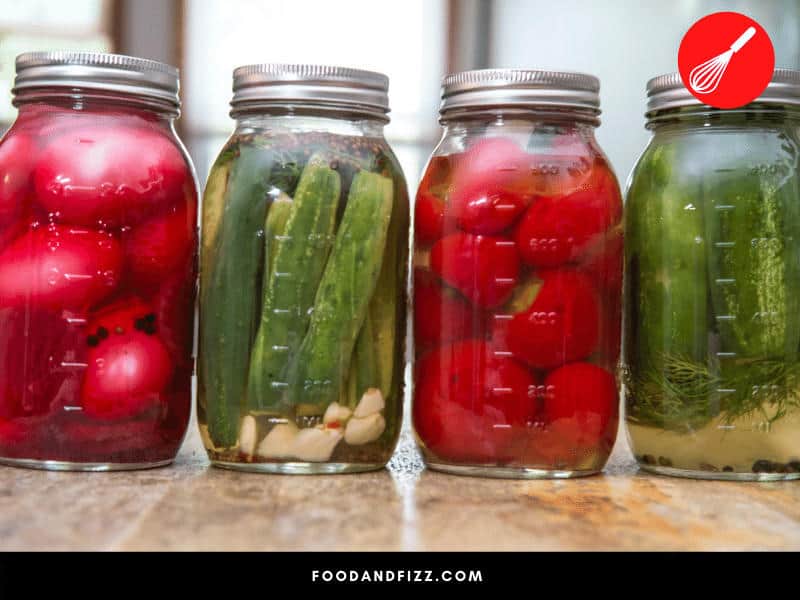
How Do I Prepare Pickled Eggs and Refrigerate Them
Preparing pickled eggs is not as hard as it may sound. It’s something that doesn’t require unique expertise. Here is a simple recipe that one could follow.
Ingredients
- 250 mL of white vinegar
- 250 mL of water
- 1 Tablespoon of granulated sugar
- 1 Tablespoon of salt
- 2 Tablespoons of pickling spice
- 12 eggs.
Procedure
- Step 1: Boil your eggs till they are hard-cooked.
- Step 2: Peel off the shell and let them cool to room temperatures.
- Step 3: Mix water, pickling spice, sugar, salt, and vinegar in a small saucepan.
- Step 4: Heat the mixture to boil while stirring regularly to dissolve the sugar and salt. Turn the heat knob of your cooker to low, then cover and cook the mixture for about 10 minutes.
- Step 5: Place the eggs in a one-liter sealable jar. Pour the hot mixture over the eggs placed in the jar until it’s full.
- Step 6: Cover the jar with a tight lid.
- Step 7: Place the jar in the refrigerator and set the temperatures at about 32 °F.
How to Color My Pickled Eggs
I like dying eggs just for fun. The cuteness is thrilling and somehow appetizing for me! To dye pickled eggs is probably one of the easiest things to do.
That’s because the coloring and the pickling process align so well. Therefore, using the procedure described above for pickling the eggs, here are a few more things to do to get the eggs colored.
One extra thing I add to my ingredients is the food colors dyes, which come in various colors. Following the steps outlined above, I add one tablespoon of the dye to the vinegar solution at step 3 and stir thoroughly.
From there, I continue with the rest of the procedure. I do the same for each color, and the result is excellent.
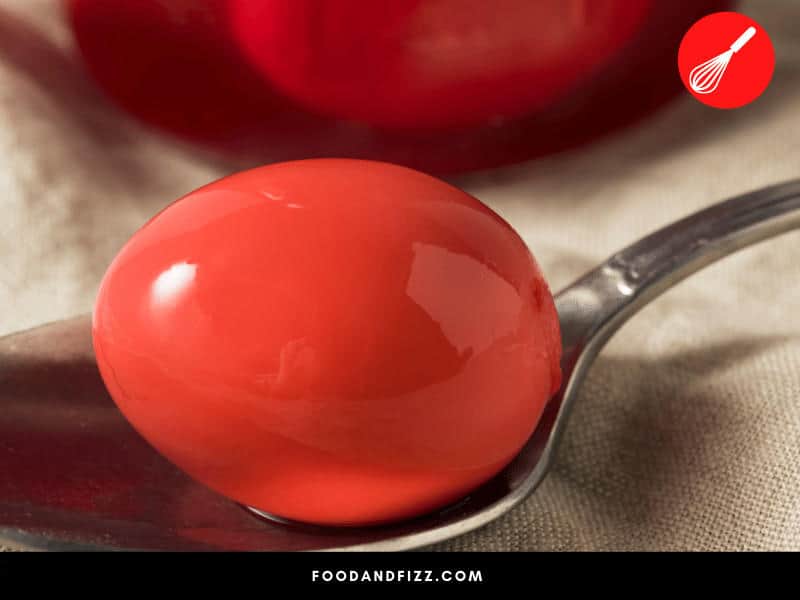
How to Tell Pickled Eggs Have Gone Bad
Even when pickled and refrigerated, I realize pickled eggs may still go bad. That could result from several factors, including not sealing the container properly. Other reasons may comprise impurities in the water, vinegar, and other components.
An unclean container or dysfunctional fridge may also lead to the pickled eggs going bad. However, how do I tell that my pickled eggs have gone bad?
Here are some traits I use to establish that my pickled eggs have gone bad.
1. Foul smell
Like in all the other types of food, when pickled eggs go bad, they produce a filthy smell. When I notice the foul odor, there is no better sign that the eggs have gone bad and it’s time to discard them. Sometimes the awful smell is too strong that it chokes a person. Consuming eggs that produce this foul smell could be detrimental to one’s health.
2. Bulging lids
If the lid on the jar bulges up, there is too much pressure build-up from the inside. The most likely reason for this is the high acidity levels in the pickling solution. Such high acidity levels are dangerous to one’s health. So, in such a situation, the option is to throw away the eggs.
3. Bubbles
Bubbles are an indication that certain gases are collected within the jar as the fermentation process takes place. However, when they are excessively many, it could indicate that the pickled eggs have gone bad. In that case, the pickled eggs are not fit for consumption and should be thrown away.
4. Color changes
I’m always keen to check indicators like color change. That’s why the moment I notice the color of my pickling solution has changed, I immediately dispose of the eggs.
In most cases, the change in color of the pickling solution indicates the presence of fungus, which is a health hazard to anyone who consumes the eggs.
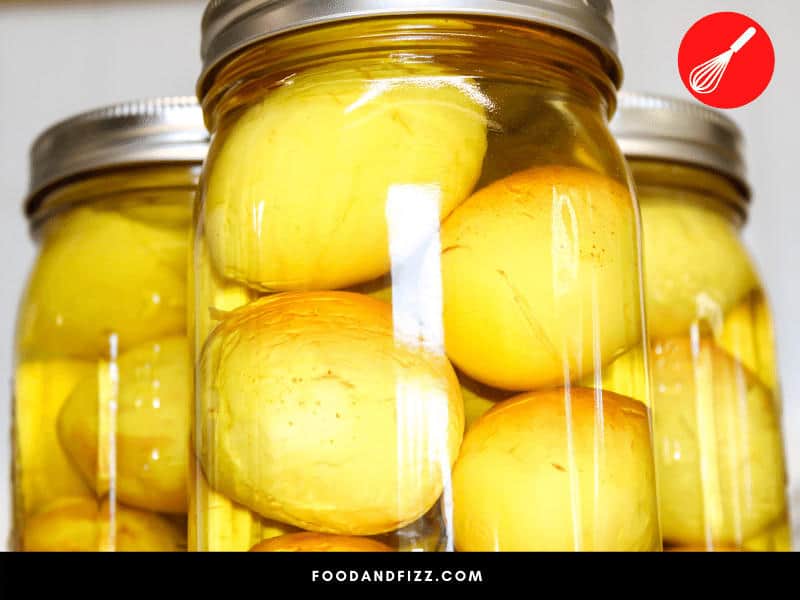
Frequently Asked Questions on Do Pickled Eggs Need to Be Refrigerated?
Are pickled eggs safe for eating?
Yes. Pickling the eggs is a preservation process, ensuring the eggs do not go bad. Besides, the ingredients involved are safe for consumption.
Must I refrigerate my pickled eggs?
It is advisable to refrigerate pickled eggs. Leaving them at room temperature may lead to bacteria emergence, which would make them go bad.
How can I tell my pickled eggs have gone bad?
When pickled eggs go bad, they change color, produce a foul smell, and could have a lot of air bubbles. It’s advisable to throw them away.

